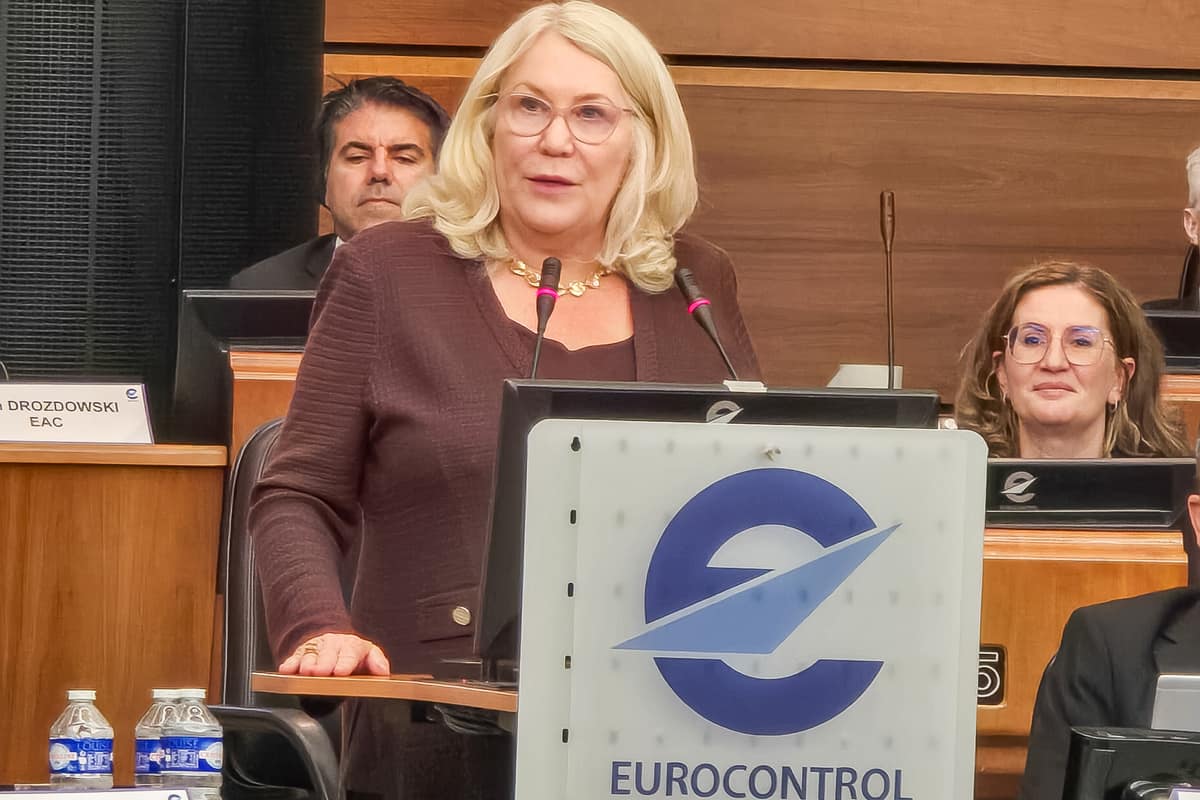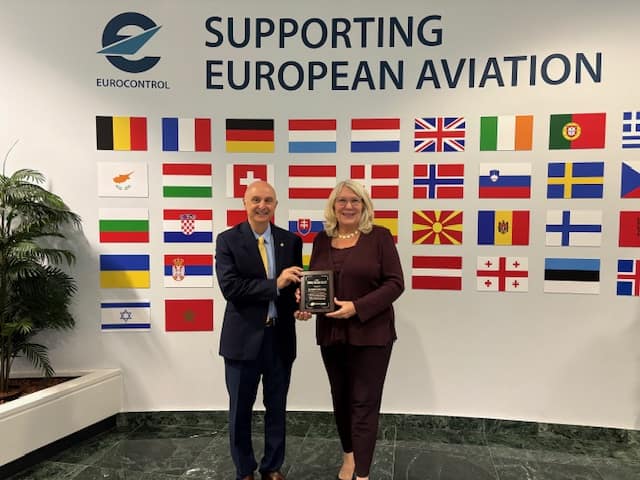Embry-Riddle Professor Honored for Groundbreaking Research on Language in Aviation

Embry-Riddle Aeronautical University Associate Professor Elizabeth Mathews, who has dedicated her nearly 32-year career to the critical study of language as a human factor in aviation, has been recognized by the Flight Safety Foundation with its prestigious Safety Forum Award.
The Safety Forum Award is granted to individuals who have made significant contributions to aviation safety through innovative research and practical applications. The Foundation’s criteria for this honor include demonstrable improvements in safety protocols, impactful research findings and a commitment to fostering safer aviation environments.
“The role of language in aviation has long been recognized as an important element of aviation safety. However, industry understanding of language factors in aviation lags behind that of other human performance factors,” said Mathews, who received the award at a June 5 ceremony in Brussels, Belgium.
Mathews’ comprehensive research has been critical in highlighting the importance of language factors in aviation, and she stresses this importance in her daily work in Embry-Riddle’s Aviation and Aerospace Safety program at the College of Aviation on the Daytona Beach Campus.
Language as a Human Factor
Several major accidents, including a series of fatal accidents in the 1990s, spotlighted the role of language in aviation. In 2001, a runway accident in Italy that claimed the lives of 118 people was determined to have been partially caused by language barriers and inconsistent communications.
Concern over the role of language as a significant contributor to airline accidents created heightened awareness by the International Civil Aviation Organization (ICAO) — where Mathews previously worked as a linguistic consultant — and led to the development of the ICAO language proficiency requirements (LPRS).
“Working at ICAO highlighted to me that the role of applied linguists in the aviation industry is not only to act as aviation English teachers but to understand that we are, most importantly, safety advocates,” said Mathews.
Mathews’ Work at Embry-Riddle
When Mathews arrived at Embry-Riddle in 1994, she became aware that there were no English language testing standards for pilots and air traffic controllers, and very few resources were available for teaching aviation English.
She set out to help change that.

Mathews receives the prestigious Safety Forum Award from Dr. Hassan Shahidi, president and CEO of the Flight Safety Foundation. (Photo: Embry-Riddle/Elizabeth Mathews)Mathews and her colleagues began to meet at Federal Aviation Administration conferences and seminars to discuss this issue. “At the time, there were very few resources available for the teaching of aviation English,” she said.
Mathews has long advocated the need for academically qualified English as a Second Language (ESL) specialists to guide the development and delivery of effective aviation English teaching and testing programs. In addition to her guidance of aviation English programs at Embry-Riddle, she recently spearheaded an effort to explore, create, clarify and implement Embry-Riddle’s Language as a Human Factor in Aviation Safety (LHUFT) initiative at the university.
Embry-Riddle has long been recognized as a leader in global aviation English.
Enhancing that leadership, in 2017, Mathews formed the Embry-Riddle Language as a Human Factor in Aviation research committee — an effort to bring a systematic operational and linguistic review of hundreds of aviation accident investigation reports on the Flight Safety Foundation’s Aviation Safety Database. Based on the committee’s research, Mathews and fellow researchers developed a taxonomy of Communication Factors in Aviation and published the Embry-Riddle LHUFT Handbook for Investigators to support air safety investigators in identifying, analyzing and reporting language factors in their investigations and reporting. The research of Mathews and the LHUFT Committee have supported and informed the development of innovative courses designed to improve English language skills among international aviation personnel.
“I am thrilled by our growing network of international training partnerships, including air traffic control authorities, airlines, international training centers, and regulatory bodies worldwide,” she said, regarding efforts to develop and deliver a number of aviation English programs in partnership with air traffic control authorities, airlines, international training centers, regulatory bodies worldwide, aviation industry organizations, airlines and air navigation service providers.
Extraordinary Contributions to Aviation Safety
It’s notable that Mathews’ groundbreaking work is being recognized now.
According to Dr. Hassan Shahidi, president and CEO of the Flight Safety Foundation, Mathews has long been a pivotal figure in the field of aviation linguistics and safety. “Professor Mathews has made extraordinary contributions to aviation safety through her research on language and communication. Her dedication and innovative approach have set new standards in the field, and we are proud to honor her achievements with the Safety Forum Award."
Embry-Riddle President P. Barry Butler, Ph.D., lauded Mathews for her significant contributions to the industry. “Professor Mathews’ work has profoundly impacted aviation safety, and her recognition by the Flight Safety Foundation is well-deserved. At Embry-Riddle, we are proud of her contributions to the field and her unwavering commitment to improving communication in aviation.”
Robert Sumwalt, executive director of the Boeing Center for Aviation and Aerospace Safety at Embry-Riddle and former chairman of the National Transportation Safety Board, couldn’t agree more with the Flight Safety Foundation’s decision to honor Mathews.
“Professor Mathews’ dedication to improving aviation safety through her research on language and communication is truly commendable. Her work highlights the crucial role these elements play in accident investigation and prevention, and her contributions have significantly advanced our understanding and protocols in ensuring better safety standards in aviation,” he said.
While Mathews expressed her heartfelt gratitude for the recognition, she is quick to emphasize that the accolade reflects the collective efforts of her colleagues and collaborators. She particularly credited the International Civil Aviation Organization PRICE Study Group and her current LHUFT research team at Embry-Riddle, along with the Department of Aviation English at Embry-Riddle’s Worldwide Campus.
“In receiving this award, I am honored to represent the incredible team that has worked tirelessly to improve communication in aviation,” Mathews said. “This recognition is a testament to our shared commitment to enhancing safety through language research.”
